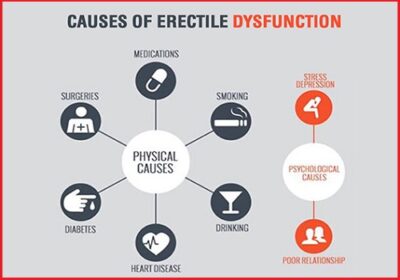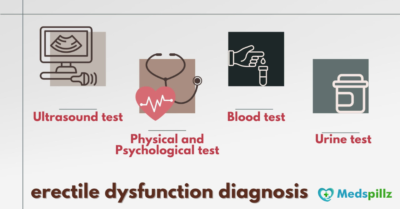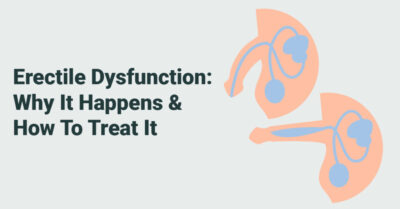Erectile dysfunction, often known as ED is the inability of achieving and maintain an erection that is suitable for sexual intimacy. According to estimates, approximately one in 10 men suffers from ED in the long run.
1. OVERVIEW
What is Erectile Dysfunction(ED)?
Erectile dysfunction (ED) refers to the difficulty to obtain and maintain an erection that is firm enough to allow sexual intimacy. Estimates indicate that one out of every 10 males will suffer from ED in some way in his life. It is essential to realize that, in the majority of cases, ED is a symptom of a larger, more serious issue. ED isn’t thought to be normal at any time and can be connected with other conditions which interfere with sexual intimacy like a lack of desire, and issues with ejaculation or orgasm.
How prevalent is erectile dysfunction?
About one-tenth of males over the age of 40 will be affected by ED over the long term.
Some men experience occasional difficulty in achieving an erection that can be due to various causes, such as drinking excessively stress, relationship issues, stress, or being too exhausted.
Failure to achieve an erection for less than 20% often is not uncommon and usually doesn’t require treatment. However, failure to get an erection over 50% often typically suggests there’s an issue and the need for treatment is evident.
ED doesn’t have to be an issue with becoming older. Although older men might indeed require extra stimulation, the majority of men still should be able to get an erection and have fun with intimacy.
2. SYMPTOMS AND CAUSES
What is the cause of Erectile dysfunction (ED)?
ED is brought about by various reasons, including:
- Vascular diseases The flow of blood to the penis may be blocked or narrowed because of vascular diseases like atherosclerosis (hardening of the arteries).
- Neurological diseases (such as MS): Nerves that transmit impulses to the penis may become damaged due to diabetes, stroke, or other causes.
- psychological states They incorporate sadness, stress burdensome, failure to invigorate the cerebrum, and uneasiness about execution.
- Trauma An injury may be a contributing factor to the manifestations of ED.
Chronic illness, certain medicines, and a condition known as Peyronie’s disease may also trigger ED. Activities for the prostate, bladder, and colon malignant growth may likewise be contributing variables.
What drugs could trigger Erectile dysfunction (ED)?
Erectile dysfunction (ED) can be a frequent consequence of a variety of prescription medications. While these medications can help treat a condition or disease, while doing so, they may affect men’s hormones, nerves, or blood circulation, leading to ED or raising the likelihood of ED.
If you are experiencing ED and believe it could be the cause of the medicine you’re taking, you should not discontinue taking the medication. If you continue to experience the same symptoms then consult your physician, and they might be able to recommend an alternative medication. Normal prescriptions that could refer to ED as a potentially unfriendly impact are:
- Diuretics (pills that cause an expansion in the progression of pee).
- Antihypertensives (high blood pressure medications).
- Antihistamines.
- Antidepressants.
- Parkinson’s disease medications.
- Antiarrhythmics (drugs to treat irregular heart activity).
- Tranquilizers.
- Relaxing agents for muscles.
- Nonsteroidal anti-inflammatory medications.
- Histamine H2-receptor antagonists.
- Hormones.
- Chemotherapy drugs.
- Prostate cancer drugs.
- Anti-seizure medications.
Other drugs or substances that could cause or contribute to ED include the following commonly abused and recreational drugs:

- Alcohol.
- Amphetamines.
- Barbiturates.
- Cocaine.
- Marijuana.
- Methadone.
- Nicotine.
- Opiates.
They do not just interfere with and frequently suppress the nervous system’s central part however, they can cause severe damage to blood vessels, which can lead to permanent ED.
What prescription medications can cause Erectile dysfunction?
Erectile dysfunction (ED) is a frequent side effect of many prescription medications. While these medications can be used to help treat a condition or disease, while doing so, they may affect men’s hormones, nerves, or blood circulation. This could bring about ED along with an improved probability of ED.
If you suffer from ED and suspect that it is a cause of the drug you’re taking, don’t discontinue taking the medication. If the issue persists then consult your doctor, and he/she could be able to prescribe an alternative medication. Common medications that could include ED as a possible adverse effect are:
- Diuretics (pills that cause an expansion in the progression of pee).
- Antihypertensives (medication to lower blood pressure).
- Antihistamines.
- Antidepressants.
- Parkinson’s disease medications.
- Antiarrhythmics (medication to treat irregular heart activity).
- Tranquilizers.
- Relaxing muscle mass.
- Non-steroidal anti-inflammatory drugs.
- Histamine H2-receptor antagonists.
- Hormones.
- Chemotherapy medicines.
- Prostate cancer drugs.
- Anti-seizure medications.
What other drugs or substances could cause Erectile dysfunction?
Other drugs or substances that could cause or contribute to ED are these commonly abused and recreational drugs:
- Alcohol.
- Amphetamines.
- Barbiturates.
- Cocaine.
- Marijuana.
- Methadone.
- Nicotine.
- Opiates.
Apart from the well-known issues associated with the use and abuse of these medications can bring, ED is not often talked about. But, the use of these drugs is a major risk cause for ED. They do not just cause a slowing and sometimes disruption of the nervous system’s central part however, they may also cause damage to blood vessels, resulting in permanent ED.
What are the impacts of Erectile dysfunction and depression and erectile dysfunction related?
For certain men, depression may be a symptom of the condition known as erectile dysfunction (ED). It is typical for males suffering from ED to be upset, unhappy, and unsure of their self-worth, or perhaps being less “manly.” Such feelings can lead to a loss of confidence, and in outrageous cases, gloom.
Depression that occurs with ED is manageable. The first step to address your concerns regarding depression related to ED is to open up with your partner, yourself, and your physician. Once depression is acknowledged dealing with it will become easier and less stress-inducing.
3. DIAGNOSIS AND TESTS
What is erectile dysfunction (ED), and how can it be diagnosed?
There are many causes of ED. Your primary care physician might prescribe a few tests to analyze the condition. It is solely after the reason for ED has been resolved that it tends to be dealt with actually.
Your doctor will first review your medical history. Then, the person in question will play out a total actual test. Your sexual history will be “talked with” by the specialist. A portion of these inquiries might be excessively private for you and can feel nosy. It is important to answer honestly. These questions could include:
- Which medications are you currently taking? This includes prescription drugs as well as over-the-counter and herbal drugs.
- Are you experiencing any mental problems like stress, anxiety, or depression?

- What was the first time you noticed symptoms of ED in your life?
- How frequent, how long, and what quality were your erections?
- What were the exact circumstances in which ED occurred first?
- Is it true that you are inclined to erections in the first part of the day or around evening time?
- Which sexual techniques do your use?
- Is there a problem in your relationship?
Your doctor may want to interview you and your sexual partner, as your partner might be able to provide information about the underlying causes.
Your primary care physician might arrange the accompanying tests after your conversation and the actual test.
- Complete blood counts (CBC): These blood tests can be used to detect anemia. Low red platelet counts can prompt sickliness, which can then cause weariness.
- Liver function and kidney function tests: These blood tests can help determine if ED is caused by your liver or kidneys malfunctioning.
- Lipid profile This blood test determines the level of fats (lipids) in your blood, such as cholesterol. Atherosclerosis, which is the hardening of the arteries, can be a sign that there is an issue with blood circulation and the penis.
- Thyroid function test A thyroid hormone’s primary function is to regulate the production and release of sex hormones. ED can be caused by a deficiency of these hormones.
- Blood hormone tests: The levels of testosterone and/or prolactin in the blood can be measured to determine if there are any abnormalities.
- Urinalysis – An analysis of urine can give a wealth of information, including information about protein, sugar, and testosterone levels. Abnormalities in these substances could indicate diabetes, kidney disease, or a testosterone deficit, which can all lead to ED.
- Duplex ultrasound is This test is probably the most effective for evaluating ED. The ultrasound takes “pictures” of your body’s tissues using high-frequency sound waves. An ultrasound can be used by people suffering from ED to check blood flow, and detect venous leakage, hardening of arteries, or scarring. The test can be performed while the penis remains erect (usually by injecting a drug that stimulates sexual activity) or while it is still soft.
- Bulbocavernosus Reflex: This test measures nerve sensation in your penis. Your doctor will press the head of the penis to test your nerve sensation. This should cause your anus to contract immediately. There will be a delay in the response time if nerve function is not normal.
- Nocturnal Penile Tumescence (NPT: This test measures the man’s erectile function when he is asleep. Normally, a man will experience five to six erections when he is asleep. These erections are usually absent when a man is asleep. This could indicate a problem in nerve function or circulation to the penis. Two methods are used to test the condition: the strain gauge and the snap gauge. Three plastic bands of different strengths are wrapped around the penis to perform the snap gauge method. The strength of each band determines erectile function. The strain gauge works by placing elastic bands around both the base and tip of the penis. The elastic bands can be stretched to measure penile circumference changes if the penis is erect at night.
- Penile biothesiometry This test uses electromagnetic vibrations to measure nerve function and sensitivity. Sensitivity to electromagnetic vibrations decreases could indicate nerve damage.
- Vasoactive injection This test allows blood to flow into the penis by dilation (enlargement) of the blood vessels.
- Dynamic Infusion Cavernosometry: This is a test for men who have venous leakage and ED. Fluid is pumped into your penis at a set rate during this test. Doctors can measure the rate at which fluid is pumped to achieve a rigid erection and determine the severity of the vein leakage.
- Cavernosography: This test is used in conjunction with dynamic infusion cavernosometry. It involves injecting a dye into the penis. The penis is then examined by X-rays to determine if there is a venous leak.
- Arteriography This test determines if a person is a candidate for vascular reconstruction surgery. The dye is injected into an affected artery and X-rays are taken.
Your doctor will clarify the outcomes for you before you go through any of these tests. Inquire as to whether you have any inquiries.
4. MANAGEMENT AND TREATMENT
What are the doctors who treat erectile dysfunction?
The type of specialist that treats ED is contingent on the root of the issue. Based on the medical history of your family and your personal medical history and your current health, your doctor could prescribe oral medication (Viagra(r), Levitra(r), Cialis(r)).
If none of these options work then you could be recommended to a urologist that will assist you with non-surgical options, like vacuum devices, injections, or surgical options. If required, your doctor could also refer you to an expert psychologist who specializes in sexual disorders.
How can erectile dysfunction be treated?
The treatment for ED is available in a variety of ways. Some examples include:
- Oral medication.

- Sex therapy.
- Penile injections.
- Vacuum devices.
- Intraurethral medication.
- Procedure (penile implant).
Each comes with its pros and cons. Talk to your physician to determine which is the best option for you.
The first step for treating ED is to determine the root cause. The appropriate treatment can be initiated. Many surgical and non-surgical options can assist a man to get back to normal sexual activity.
What non-surgical treatment options are available to treat Erectile dysfunction (ED)?
Communications and Education
Learning about sexual behavior and sexual behaviors can help men overcome their fears about sexual dysfunction.
Engaging with your partner in a candid discussion about your desires and worries can help you overcome the many barriers to living a healthy sexual life.
Medication
Medicines like sildenafil (Viagra(r)) and Vardenafil (Levitra(r)) or Tadalafil (Cialis(r)) can assist in improving sexual activity in men by enhancing the flow of blood to the penis. Patients taking medications that contain nitrates, such as nitroglycerine are advised not to use oral ED medication. The combination of nitrates with specific medicines can result in blood pressure dropping (hypotension).
The most frequent adverse effects of these drugs include nasal congestion, indigestion a flushing sensation, migraines, and the occasional disturbance of vision.
Mechanical assists
Vacuum apparatuses and penile constriction rings are used as erectile aids for some males.
A device that is vacuum-constricting (above) is a cylinder that is placed on top of the penis. The air is then pumped through the cylinder which draws blood to the penis, causing an erection. The erection is kept by sliding a band off from the bottom of the cylinder and into the penis’s base. The band may remain in place for as long as 30 minutes. The device is safe to treat many causes of erectile dysfunction. The lack of spontaneity as well as discomfort and the weight of the device are believed to be the main problems for patients.
Therapy for injections with penile (intracavernosal injector therapy)
The men are taught how to inject drugs straight into the penis chambers within the penis to produce a sexual erection. Injection therapy can be effective for treating a range of erection problems that are caused by blood vessels nerve, and psychological issues.
With a small needle and syringe, the man injects a tiny amount of medication into the penis’s side. The medication relaxes blood vessels and allows blood to flow to the penis. The treatment has been widely utilized in the 1980s. The three most popular medications comprise prostaglandin E1 (alprostadil) as well as papaverine (Papacon(r)) and Phentolamine (Regitine(r)).
The most frequent side effects include pain and penile damage (fibrosis). In very rare instances patients suffering from cerebral and vascular diseases or severe cardiovascular conditions may not be able the dizziness and elevated blood pressure often due to injection treatment.
A painful erection lasting more than two or three hours is known as priapism. It could be caused by injection therapy. It can be reduced by a proper dosage and adhering to the guidelines for treatment.
Sexual and psychological therapies and psychology
Psychological reasons can be a contributing factor to erectile dysfunction even if there is an obvious organic reason.
A trained counselor can assist a person deal with guilt, anxiety, or fear which could affect sexual insanity.
Sex therapy is beneficial for men in general if counseling is offered by a trained sex therapist. Sex therapy can also help men’s partners be able to accept and deal with the issues.
A patient whose ED is a direct result of a mental cause must receive counseling on sexuality before any surgical procedures are attempted.
Hormone
Low levels of hormones could contribute to ED. Hormone replacement in the forms of creams, gels, topical gel patches, injections, patches, and pellets is only available following medical evaluation.
What surgical options are available for Erectile dysfunction (ED)?
Penile prosthesis surgery
Inflatable penile prostheses can be implanted during an outpatient procedure. When they become in the body of a man they allow the man to get an erection whenever he wishes. A prosthesis can preserve penile sensation, orgasm, and ejaculation in the majority of males.
The most widely employed penile implant comprises two inflatable cylinders which are surgically implanted into the erection chambers in the penis. The cylinders connect via tubing to a reservoir that stores fluid that is located under the lower abdominal muscles and also to a pump in the sac that is located in the scrotal region.
To inflate the prosthesis for penile use is to compress the pump several times to transfer the fluid from the reservoir to the cylinders. The penis will be more erect. Inflating it makes the penis rigid and heavy, which is like an erection that you would get from a natural.
The penile prosthesis will not alter the sensation that is felt on its skin, or the ability of a man to experience the sensation of orgasm or ejaculation. The pressure of a deflation valve connected to the pump will return the fluid to its reservoir. This reverts the penis to its flaccid state.
The procedure is done by making one or two tiny incisions, which are usually concealed. Some people are unable to discern that a person wears an inflatable penile prosthesis. Surgery-related complications are not uncommon, but they are most often complications with infection as well as mechanical failure.
About 95 percent of surgeries for penile implants have been successful in producing sexual erections that allow men to enjoy sexual intimacy. Additionally, questionnaires for patient satisfaction indicate that 90% of those who have had implants say they would prefer to undergo the procedure again. Furthermore, the overall satisfaction scores are higher than those recorded by patients who are taking oral medication or penile injection treatment.
5. PREVENTION
Can erectile dysfunction (ED) be avoided?
For individuals who are at threat of creating ED as a result of individual habits, steps might be required to try to avoid this incident. However, other reasons might not be avoidable.
A variety of studies currently recommend a web link between ED as well as excessive weight, high cholesterol, hypertension, diabetic issues as well as cardiovascular disease.
The following referrals may assist prevent ED or enhance the issue if it is currently present:
- Eat a healthy diet. A diet regimen that restricts saturated fat consumption and also includes numerous parts of fruits, vegetables, and also whole grains can benefit males with ED.
- Lower cholesterol. High cholesterol can solidify, narrow, or block the arteries (atherosclerosis) resulting in the penis. The guy can reduce cholesterol via diet, exercise as well as medication.
- Preserve a healthy weight.
-
Exercise consistently. Routine workouts might decrease the danger of ED. Select exercises that you delight in as well as will certainly make a regular component of your day. Along with decreasing the threat of ED, workouts also can assist you to manage anxiety. Get in touch with your physician before beginning any type of exercise program.
6. LIVING WITH
What should I do if I am having issues achieving/keeping an erection?
If you presume you have erectile dysfunction, please see your healthcare doctor or a urologist. She or he can do examinations to discover what is creating your trouble as well as refer you to a professional if needed. When the cause is identified, there are a number of treatment choices to select from.
Does the insurance policy cover erectile dysfunction (ED) treatment?
Insurance policy insurance coverage for ED relies on the kind of treatment suggested and whether your insurance coverage covers sexual dysfunction at all. Talk to your insurance policy service provider to determine if the alternative you are considering will be covered.
Follow Us For Mor Information:- Instagram
Fildena 100 | Fildena 200 mg | Fildena 25 mg | Fildena 50 mg | Fildena 150 mg | super Fildena |Fildena XXX
vidalista 20 mg dosage | vidalista 20 mg online | vidalista 20 reviews | vidalista 20 mg | vidalista 20 how long does it last | buy vidalista 20 | flashback arturo vidal fifa 20 | vidalista 20 review | what is vidalista 20 | vidalista 20 for sale | vidalista 20 side effects | vidalista 20 mg from usa | how to take vidalista 20 | super vidalista 20 mg | tadalafil sublingual tablets 20 mg vidalista professional | vidal fifa 20 | vidalista 20 centurion laboratories

